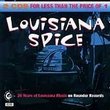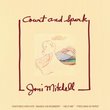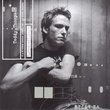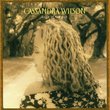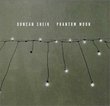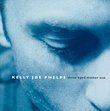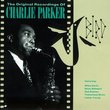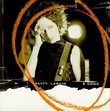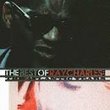| All Artists: Sekou Sundiata Title: Long Story Short Members Wishing: 0 Total Copies: 0 Label: Righteous Babe Original Release Date: 2/8/2000 Release Date: 2/8/2000 Genres: Jazz, Special Interest, Pop, R&B, Rock Style: Poetry, Spoken Word & Interviews Number of Discs: 1 SwapaCD Credits: 1 UPCs: 748731701826, 748731701840 |
Search - Sekou Sundiata :: Long Story Short
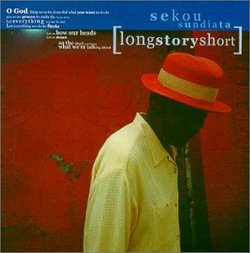 | Sekou Sundiata Long Story Short Genres: Jazz, Special Interest, Pop, R&B, Rock
With its dedication to Amadou Diallo and its poems covering subjects like reparations, slavery, and Mary J. Blige, Sekou Sundiata sets out to make "poems that are African American as bean pies and be-attitudes." There's a ... more » |
Larger Image |
CD DetailsSynopsis
Amazon.com With its dedication to Amadou Diallo and its poems covering subjects like reparations, slavery, and Mary J. Blige, Sekou Sundiata sets out to make "poems that are African American as bean pies and be-attitudes." There's a righteous anger that permeates this disc, but its expression comes off more as a burning coal than a blowtorch--that is, instead of using the staccato rhythms and the relatively harsh vocals of the rappers, Sundiata's approach is more down-tempo, almost elegiac, and his voice is mellifluous, intimate, and warm. Not a huge voice like, say, James Earl Jones; rather, he uses a slow, seductive, clearly enunciated delivery to draw you into his words. His interest is to write popular verse that functions both as dance music and serious spoken poetry. To him, it's not an either/or, you can do both-you can "dance and be still." While most people won't be dancing to this disc, the music-mostly keyboards, bass, and drum-is coolly competent, and his efforts to make poetry accessible are more than commendable. --Wally Shoup Similarly Requested CDs
|
CD ReviewsSekou Sundiata does it again. Steve Rowland | Philadelphia, PA | 04/30/2000 (5 out of 5 stars) "Sekou Sundiata proves himself to be one of the most daunting artists able to combine poetry and music. His work continues in the tradition (set with extraordinary standards) by Langston Hughes with Charles Mingus, and later by Amiri Baraka with David Murray and Jayne Cortez and the Firespitters.On Longstoryshort, Sundiata continues his deep previous explorations of American culture, racism, music and more-- and with great success combines them with music for life -- this CD has something for everyone -- great beats, memorable grooves and searing words. Poems about Harlem, about Nelson Mandela, about listening to Eric Dolphy with a past love. A blessing." Perfect Blend Zach | Logan, UT | 06/29/2001 (5 out of 5 stars) "I've read the negative reviews of Sundiata's albums, and I can understand how his art is not for everybody. Nevertheless, if you are looking for something more from today's fairly shallow popular musical scene, the work of Sekou Sundiata is an excellent place to turn. His poetry blends perfectly with the music and draws the listener into the tribal rythm of his voice and the pulsing funk/blues accompaniment. I recently saw Sundiata open at an Ani Difranco show and his live performance is equally strong. An artist in all respects, Sundiata brings his message to the masses in a form that both pleases and inspires. For those who don't readily associate with poetry, the accompaniment offers an alternative in understanding the pieces on this album. I would highly recommend the work, but would suggest that you listen to some other more (but not quite) mainstream artists before attempting this sonic journey into the heart of Black America." Sundiata tells it like it is rhonnie2 | Michigan | 07/16/2001 (5 out of 5 stars) "Sekou Sundiata describes his work as "rhythm and news"; taking the beats of the street and using them as a backdrop for his poetry. Captivating and engaging songs tell the story of the African American people... Sundiata's music echoes these sentiments. Whether a poem about slavery of the past or street life of the present, each one holds many striking truths. His style of layering spoken word over R&B and jazz with smooth vocals makes his work appealing accross many age groups and backgrounds. Fans of R&B, jazz, soul, folk rock, and poetry alike will embrace Sudiata's message; we can't live our lives today without remembering how we got here."
|

 Track Listings (15) - Disc #1
Track Listings (15) - Disc #1